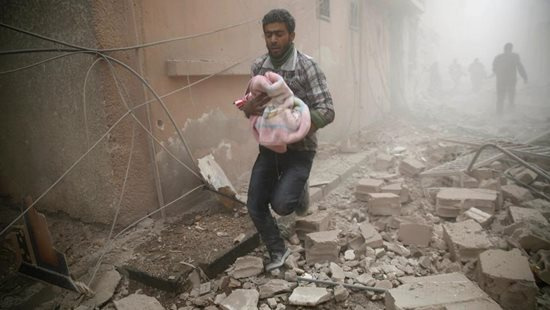THE WEST: ONLY KILLING CERTAIN CIVILIANS IS A CRIME

Dr. Azmi Bishara
It was perhaps embarrassment that has led international diplomats to stop being mere spectators in the tragedy of the Syrian people, and launch marathon efforts and conferences for its ostensible resolution.
Even the otherwise tireless media has grown tired. And sympathisers with the Syrian people wasted precious time claiming nothing could be done, as long as the Syrian opposition was disunited.
Two whole years and almost a third of the life of the rebellion (so far) had passed, without anyone having ever heard of the Islamic State group, whose emergence slowed Syria's slip down the headlines.
Yet every year of those felt like a century for the Syrian people, because unlike the international community, Assad did not waste a single day, ensuring Syrians were killed, tortured or dispossessed around the clock.
Then at long last, the Western countries confessed that the two main problems in Syria - for the West - were IS, and the refugees flocking to their shores.
The West placed the Syrian regime at the bottom of the list of problems.
In vain, the Arabs waited for the US and Europe to develop an earnest stance on the suffering of the Syrian people.
But the Arabs also wasted precious time they could have put to better use by looking for alternatives to Western support.
The various constituent fragments of the Syrian opposition were not innocent of time-wasting either.
At the outset, many in the ranks of the opposition wished for the Libyan model in Syria, despite what happened in Libya ultimately and Iraq before it.
The opposition failed to develop an organised political-military alternative. Many in the opposition failed to see that proposing an alternative was an urgent priority no less important than fighting the regime.
Peaceful uprising to militarisation
Meanwhile, both Western and Eastern powers have been fully aware the crux of the problem in Syria lay in the nature of the ruling regime.
Everyone has been fully aware that this regime's refusal to heed the demands of a civil uprising - whether through reform or by stepping out of the way if reform were impossible - and the regime's insistence on a military-based approach in suppressing the popular uprising has neutralised the peaceful protests.
As a result, the Syrian revolution spawned localised spontaneous self-defence formations. However, these failed to develop into a unified, nationwide armed front.
Soon enough, organised armed militias were drawn in to the battlefield.
Some of these had nothing to do with the goals of the Syrian revolution, and did not differentiate much between the regime and opposition to begin with.
For these groups, everyone else was an infidel.
Some were not radical religious groups, but opportunistically adopted religious slogans anyway.
Then, when armed struggle became the only option in the confrontation with the regime, no adequate strategy was developed, due to the extreme fragmentation of the armed groups in Syria.
A blind eye to the regime
The Syrian people rose up against oppression, humiliation and the systematic plundering perpetrated under the regime.
Before the Syrian people rebelled, silence in the face of the regime's crimes was possible, because of its various - and often conflicting - regional roles.
But the nature of the regime was known to all.
When the Syrian people rose up, everyone knew they had good reasons to do so, perhaps more so than other peoples. For this reason perhaps, the silence became embarrassing.
There was no other choice than to express sympathy with the Syrian people.